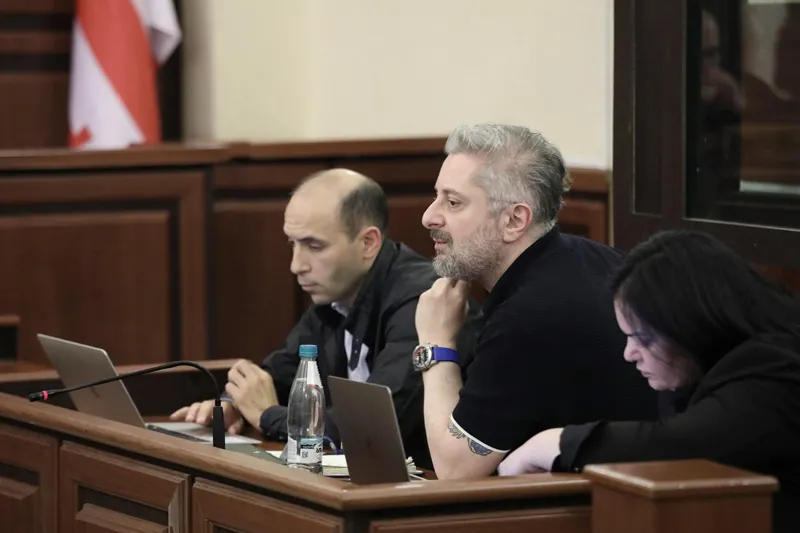
The case of Nika Gvaramia, the leader of the “Coalition for Change,” has been submitted to the court for substantive review. This decision was made by Judge Levan Gelovani of the Tbilisi City Court.
As Judge Gelovani explained, at this stage, the body of evidence presented by the prosecution provides, under a high standard of probability, grounds to assume that a guilty verdict could be issued against the defendant.
At the hearing, the prosecution argued that with a high degree of probability, Nika Gvaramia will be found guilty in the criminal case against him. Therefore, there is no basis to terminate the prosecution. The defense disagreed with this motion, stating that not only is there no high standard of probability, but there is no formal basis at all.
During the proceedings, Nika Gvaramia and his lawyers argued that the action in question — failure to comply with a request by the temporary parliamentary investigative commission — constitutes an administrative offense. They pointed out that the same provision exists in the Code of Administrative Offenses [Article 173.3], and that criminal prosecution should not have been initiated.
Gvaramia asked, “Between a minor and a serious offense, why is the serious one being applied, when all doubts should be interpreted in favor of the lighter one? How does this become a criminal case? The commission developed a practice of bypassing the administrative code and treating non-compliance as a more serious offense, referring the case to another authority,” he said.
According to prosecutors, however, since 1999, such actions have carried criminal liability.
“After 26 years, a 25-year-old prosecutor tells me a new Criminal Code has been created and the old Administrative Code is practically annulled. I asked the prosecutor — where did he get this from? Which book did he read it in? Who told him that a norm still in force is essentially abolished or dysfunctional? There’s no such thing in law. Let me remind everyone again — this is a criminal trial, not a discretionary process. Constitutional principles exist to protect the defendant, not the prosecution,” Gvaramia stated.
He called on Judge Levan Gelovani to dismiss the case.
“Don’t send me to a place where there will be greater interference in my constitutional status, especially when this is not allowed under the Georgian Constitution. The case must be terminated. But if you can’t make that decision, ask the Constitutional Court. You must stop the case and refer it to the Constitutional Court to determine how both the legislature and the judiciary should act in such a situation,” Gvaramia told the judge.
There were several arguments during the hearing. One of Gvaramia’s remarks to the prosecutor — “You were born after 1999, what are you even called?” — irritated the judge, who called on Gvaramia to remain respectful.
“How can a former prosecutor speak to a current prosecutor like that?” the judge asked Gvaramia.
“If a prosecutor realizes that the actions in question do not contain criminal elements, they must drop the charges… You’re asking for my detention, and I’m not even allowed to know on what basis? We’ve come to a point where you’re not referring to the Criminal Code but to someone’s directive?” Gvaramia said.
Judge Levan Gelovani asked whether this decision would contradict the one made in Mamuka Khazaradze’s case. Gvaramia replied that no such motion had been submitted in that case, and that he couldn’t speak for other attorneys. He added that while he could speak for hours about the illegitimacy of the parliament and the commission, he had submitted a completely different motion.
The prosecutors explained during the hearing that, according to the Criminal Code, failure to appear before a parliamentary investigative commission and refusal to provide an explanation are both punishable offenses. They also argued that newer laws should take precedence.
“So I’m covered by two laws?” Gvaramia asked.
According to lawyer Dimitri Sadzaglishvili, it’s not about applying the latest law — the standard is to apply the provision that imposes a lighter penalty.
For reference, Nika Gvaramia is charged under Article 349 of the Criminal Code, which refers to “failure to comply with a request by the temporary investigative commission of the Parliament of Georgia.” The offense is punishable by a fine or up to one year of imprisonment, and disqualification from holding office or engaging in a specific activity for up to three years.
As a preventive measure, Gvaramia has been ordered to pay bail in the amount of 30,000 GEL. He was given 50 days to pay, and the deadline expires on June 7. Gvaramia’s position is publicly known — he does not intend to pay the bail.
v-if="article.gallery" v-html="article.gallery"
(adsbygoogle = window.adsbygoogle || []).push({});